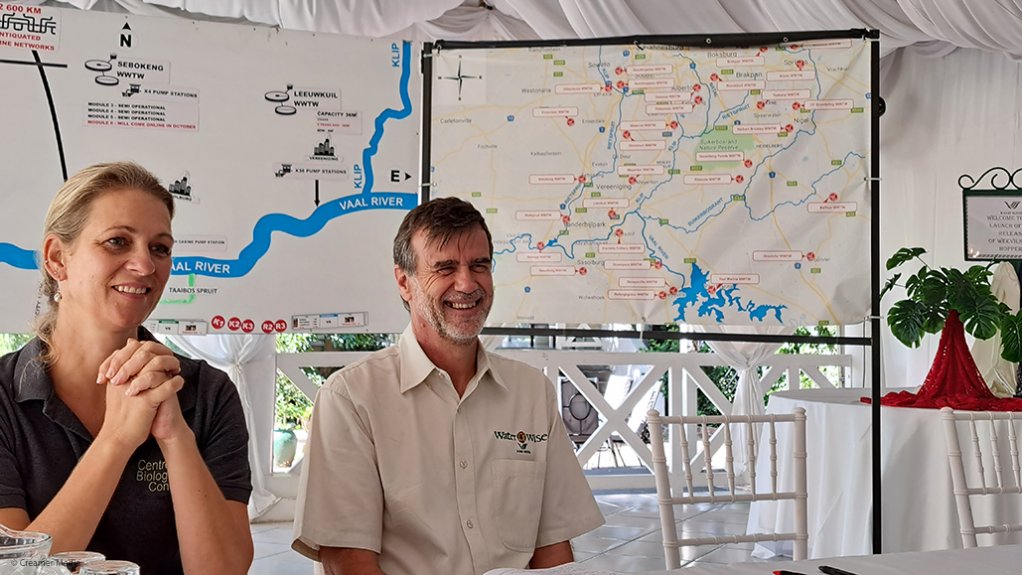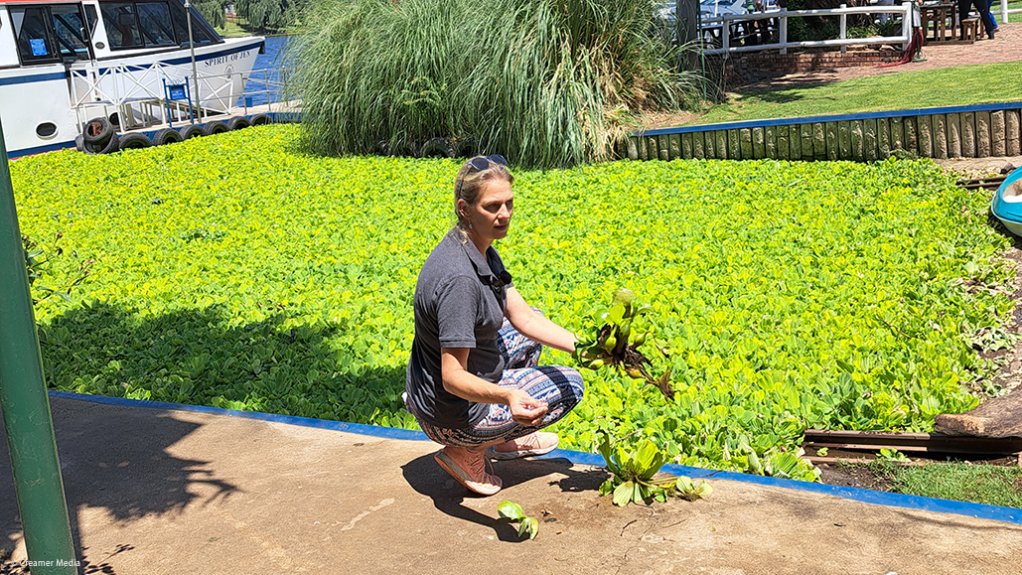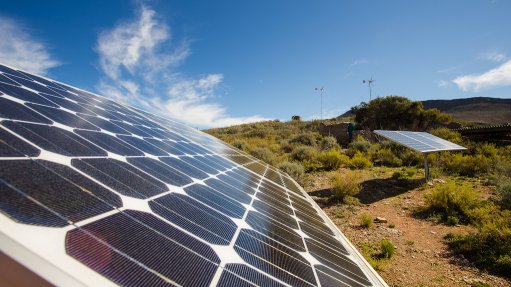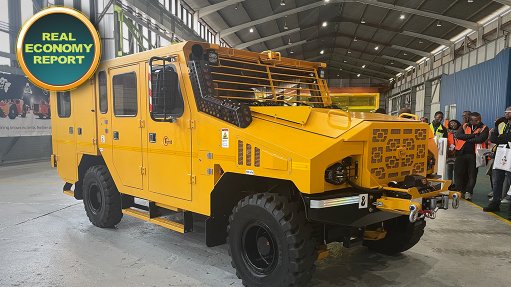Rand Water kicks off programme to weed out water lettuce in the Vaal river




Photo by Creamer Media's Natasha Odendaal
Photo by Creamer Media's Natasha Odendaal
Photo by Creamer Media's Natasha Odendaal
Rand Water on Thursday released the first batch of weevils and hoppers as biocontrol agents to start eliminating the invasive water lettuce in the Vaal river.
The programme, which formed part of Rand Water’s efforts to remove the alien invasive water plants at the Vaal Barrage, entailed an integrated approach combining physical removal, chemical control and biological control, said Rand Water corporate services GM Mbuyiswa Makhubela.
The local community has embarked on the physical removal of the invasive aquatic plant and earlier this week, the team sprayed the specially formulated and Department of Water and Sanitation- and Department of Forestry, Fisheries and the Environment-approved chemical controls, at very specific dosage rates.
On Tuesday, following a small ceremonial release at Stonehaven on the Vaal, in Vanderbijlpark, the team released hundreds of the biological agents – weevils and hoppers – across several sites across the Barrage area, including Rietspruit, Cloudy Creek, Leeuspruit and Taaibosspruit, said Rand Water environmental services manager Dr Lesley Hoy.
He said that the extent of growth of the water lettuce had not been seen elsewhere in South Africa and Rand Water had been working with Rhodes University and various technical experts to develop options to mitigate the challenge, through the use of biological agents, or what Centre for Biological Control deputy director Dr Julie Coetzee called a nature-based solution.
“The extent of the problem is almost a new facet to try and deal with. Added to that, we do not only have water lettuce, but hyacinth as well. Unfortunately, the weather and the [poor] water quality have not helped. So the growth has continued unabated,” said Hoy.
The invasive species, which evolves under very dynamic conditions where they can tolerate all kinds of aquatic ecosystems, becomes so invasive owing to an endless supply of food, no natural controlling regulations and South Africa’s short, slow rivers, impoundments and still dams and rivers with slow moving water, as well as subpar water quality and heat.
Released onto the aquatic plants, the insects ate on and damaged the plants, which eventually killed them off, and while it did take time and required patience, their long-term use on the invasive plants was safe, environment-friendly and sustainable, reducing the need for chemical control, Coetzee explained.
While there is a need to get rid of a large majority of these plants as quickly as possible, which is where the manual removal or the chemical treatment plays a significant role, biological control can control the majority of these floating aquatic species.
Hoy told Engineering News that the programme would be ongoing with the release of biological agents every few weeks, with the insects being reared in Grahamstown and at the newly established hot house within Rand Water’s nursery in Alberton, for future releases.
Rhodes University developed a monitoring application for the project, which provides satellite imagery that gets uploaded and updated once a week, enabling Rand Water and other interested stakeholders to monitor the extent of the growth of the water lettuce, the extent of the problem and to see where it had had impact.
“As part of this, we will also be engaging with the community to set up their own growing stations under the auspices of Rhodes University and Rand Water,” said Hoy, noting that the approaches could be coordinated to obtain data for future use and mitigation should these invasive plants arise somewhere else in South Africa.
While the team is releasing relatively few weevils and hoppers during the summer period, the aim is to gear up and grow exponentially, so that by spring, the biological agents can be released on a large scale as early as the temperatures will allow.
“The phase between the growth and the germination of the invasive species occurs quicker than the weevils recuperate after winter. Our aim is that if we have stock of weevils and hopper, we can introduce them early in spring or later this year,” Hoy said.
Coetzee commented that the plants produced thousands of seeds that remained viable for a very long time. During winter, the plants went dormant, but started growing out again in the summer months.
“As soon as they come back in summertime, we have to get those insects out as quickly as possible, and we have to get as many as possible . . . as frequently as possible. In that way we can knock the populations and keep them down.”
Comments
Press Office
Announcements
What's On
Subscribe to improve your user experience...
Option 1 (equivalent of R125 a month):
Receive a weekly copy of Creamer Media's Engineering News & Mining Weekly magazine
(print copy for those in South Africa and e-magazine for those outside of South Africa)
Receive daily email newsletters
Access to full search results
Access archive of magazine back copies
Access to Projects in Progress
Access to ONE Research Report of your choice in PDF format
Option 2 (equivalent of R375 a month):
All benefits from Option 1
PLUS
Access to Creamer Media's Research Channel Africa for ALL Research Reports, in PDF format, on various industrial and mining sectors
including Electricity; Water; Energy Transition; Hydrogen; Roads, Rail and Ports; Coal; Gold; Platinum; Battery Metals; etc.
Already a subscriber?
Forgotten your password?
Receive weekly copy of Creamer Media's Engineering News & Mining Weekly magazine (print copy for those in South Africa and e-magazine for those outside of South Africa)
➕
Recieve daily email newsletters
➕
Access to full search results
➕
Access archive of magazine back copies
➕
Access to Projects in Progress
➕
Access to ONE Research Report of your choice in PDF format
RESEARCH CHANNEL AFRICA
R4500 (equivalent of R375 a month)
SUBSCRIBEAll benefits from Option 1
➕
Access to Creamer Media's Research Channel Africa for ALL Research Reports on various industrial and mining sectors, in PDF format, including on:
Electricity
➕
Water
➕
Energy Transition
➕
Hydrogen
➕
Roads, Rail and Ports
➕
Coal
➕
Gold
➕
Platinum
➕
Battery Metals
➕
etc.
Receive all benefits from Option 1 or Option 2 delivered to numerous people at your company
➕
Multiple User names and Passwords for simultaneous log-ins
➕
Intranet integration access to all in your organisation





















